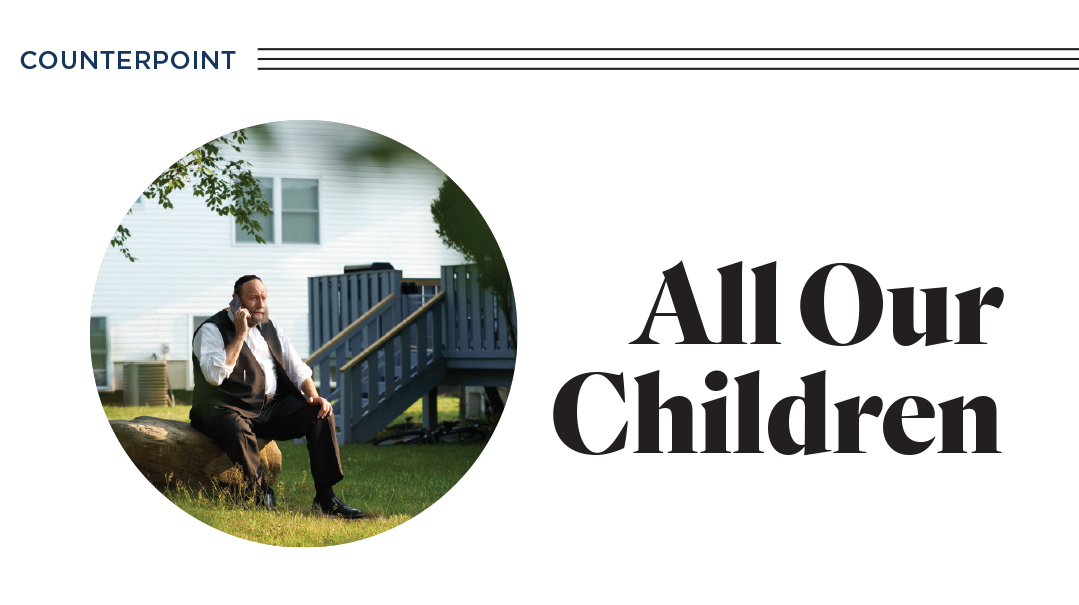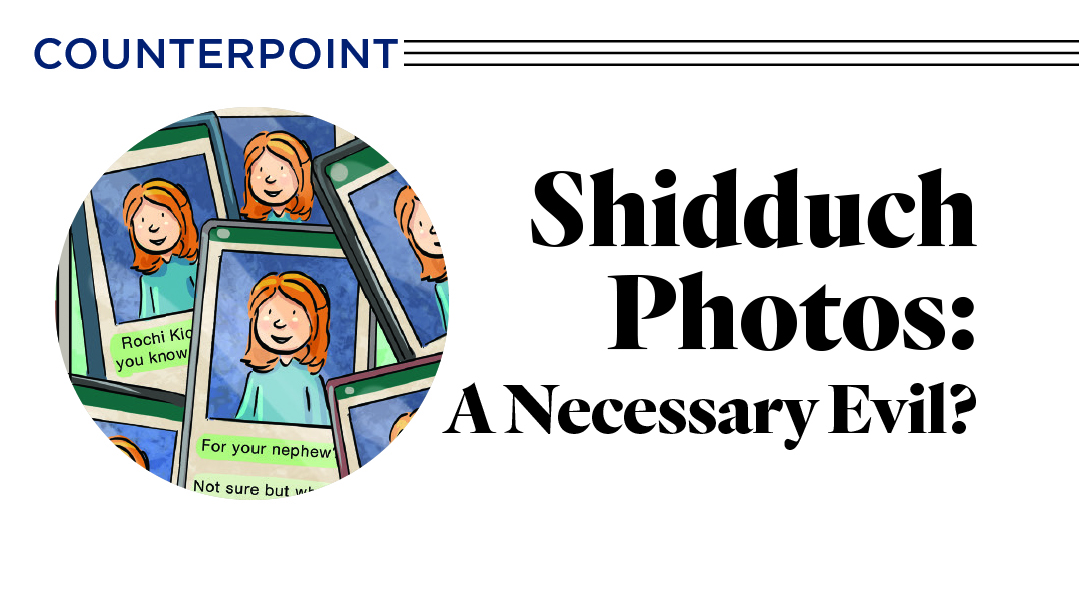Real Men: The conversation continues

Miriam Kosman’s op-ed “Real Men Might Eat Quiche” has drawn sustained and significant feedback. Here is a sampling

Man of Your Dreams — S.B.
Since my children just recently introduced me to the Kichels comic in Mishpacha on Shavuos, Miriam Kosman’s article piqued my interest because we all had shared a good laugh over the “pass the cholent” reaction of the bochur who was turned down for a shidduch.
We asked my 18-year-old bochur what he thought of her perspective, and his answer was the equivalent of “nu nu, pass the cholent.” He explained, “Of course she has a point, but a whole article?”
Mrs. Kosman succeeded in turning an interesting observation about modes of behavior that we expect and reinforce among men into a new problem that we have to deal with: How can we make our sons and their fathers more emotionally expressive? In short, how can we make them more like women?
I am sure my sons and his friends will not think too much more into Mrs. Kosman’s article, but their mothers and future wives will, and they will try all sorts of ways to get the men in their lives to express themselves more. Yet the best way to get men to learn to express themselves is to follow the time-tested Jewish formula — get that bochur married to a wonderful, secure bas Yisrael at a young age. He will slowly but surely find his more “feminine side”; it inevitably will develop as he learns to create a deep relationship with his wife and his children.
A word of advice for women to help this process along: The way to get husbands to be the men you dream of is not to make them more like women, but to empower them to be more like men, secure in their value to the family and with the trust that only you can give them that they are your heroes and will figure out a way to make you happy. Criticizing and controlling doesn’t help, it just makes them feel more insecure and vulnerable. Build them up and they will open up.
Let Boys Be Boys — Tanchum Burton, Jerusalem, Israel
I wish to provide some counterbalance to the rather femino-centric piece, “Real Men Might Eat Quiche,” penned by Miriam Kosman. The central premise of the essay is that men should learn to identify and feel their feelings more deeply and share them more readily. This is based on her idea that this is something that women excel at. Kosman attempts to base this on a source in the Gemara, where Chazal state that “ten measures of speech descended to the world and women took nine of them” (Kiddushin 39b).
The problem with this “proof” is that Chazal do not thereby intend to offer their compliments. The Maharal (Chiddushei Aggados ibid.) explains that sichah in this sense actually means excessive talk, something that suggests a deficiency in the attribute of wisdom, which is characterized by internalization rather than externalization.
The sichah that is referred to both in the verse, “And Yitzchak went out to converse in the fields” (Bereishis 24:63), and, “The prayer of a poor man when he swoons and before G-d pours out his sichah” (Tehillim 102:1), is something different. Indeed, these and other prayers suggest powerful expressions of emotion, albeit between a person and G-d, even between the community and G-d, as opposed to within a circle of peers. That is not to minimize the redemptive potential of self-disclosure to supportive people where that is appropriate, nor the return on investment in a relationship for the risk of vulnerability.
Kosman opines that healing sichah is something that women excel at, and her position is borne out by both the conventional wisdom and plenty of research. Yet there is an important point to be made. Men and women experience and express emotions differently not only because they are socialized differently, but because at the neurobiological level, males and females are distinct from one another. There is copious evidence for this. One multidimensional assessment study on empathy revealed that, “females seem to recruit more emotion and self-related regions, males activate more cortical, rather cognitive-related areas” (Derntl B., Finkelmeyer A., et al., 2010).
If this is so, then male expression should be understood as being more intrinsic to maleness than simply the “Western macho image” scorned by Judaism, as Kosman asserts a bit too broadly, in my opinion. We could all benefit from greater self-awareness and access to our emotions, and their articulation. However, we must be cautious in our evaluation of the genders with regard to this. If your typical male handles his emotions like a man, he should not be, as psychologist Michael Thompson has said, “treated like a defective girl.”
To Dwell or Not to Dwell — Leba Friedman, Yerushalayim
I thought Miriam Kosman’s op-ed about male expression was fascinating and enlightening, with so many important and beautiful insights.
I personally maintain that there can exist a man who is not glossing over or burying difficult emotions, even though it may seem like he is. Rather, he is actually extremely emotionally healthy, and he processes his feelings quickly and moves on. He thinks his experiences through in a thorough-but-fast way, and does not excessively rehash or obsess about them.
It happens to be that just the day before reading this piece, I was having a discussion with my husband about how we are on complete opposite sides of the spectrum when it comes to how much we dwell on life’s situations and our feelings about them.
I’m a “dweller” — I identify very much with Rochi Kichel’s way of dealing, and I believe there are many additional benefits to this think-things-through method (besides what Mrs. Kosman mentioned): It helps one to brainstorm solutions, helps come to a point of being dan l’kaf zechus when necessary, lends to an ability to be nosei b’ol im chaveiro, can help one to daven more sincerely because the situation is sitting so firmly on their heart, gives time to analyze and make decisions without pressure, and much more.
On the other hand, I have also seen that it’s a very slippery slope. It is quite a fine balance to process but not over-process. Overthinking or over-analyzing emotions can lead to tremendous stress (emotional, mental, and often physical as well), wasting energy stewing in anger and resentment, holding grudges, judging others, excessive worry, anxiety, speculating (and thus often drawing unfounded conclusions), working less efficiently because of being distracted, and generally wasting time and brain power.
“Non-dwellers” like my husband have taught me that there are some key advantages to their approach. Non-dwellers have a clearer mind available more often, a general relaxed emotional state, an easy time with compartmentalizing their life, and not unnecessarily intertwining different situations. They have the advantage of always being able to fully focus on whatever they’re doing, being more forgiving and quick to move on after confrontation, being able to sleep better (in quality and quantity), and to not waste their precious time and mind-space obsessing in the endless pits of “what if…” or “if only…” etc.
I feel it is important to point out that, as with everything, there are pros and cons to each of these two very different personalities, and we should each learn from each other’s ways. Maybe Rochi Kichel should, in fact, marry ABY1, and they can help each other become more balanced individuals!
All in the Details — Avi Samuels
I can’t believe that I’m analyzing the Kichels like a shtikel Gemara, but I think that Mrs. Kosman wasn’t learning the “right pshat.” The core issue being highlighted in the comic about Rochi Kichel’s failed shidduch was not that women are more emotional. It was rather that women are more detailed-oriented.
I remember dating at the same time as my younger sister. When I came back from dates, and I said either yes or no, I decided — as most men do — based on my general impression and intuition. My sister, however, analyzed every single detail of every date and replayed the conversation endlessly. (“What did he mean when he said...” “Did he hold the door…”)
It’s sort of like the distinction in gift giving between men and women. Women say it’s the little things that count, and while men go along with it, they generally don’t feel that way. A man’s mind is more generalized.
The distinction is also manifest in making cheshbonos to the last detail financially. Contrast a group of women who went out to eat vis-à-vis a group of men when the time comes to pay the bill. For the men, it will be “whatever,” but for women, it’s calculator time.
(Originally featured in Mishpacha, Issue 768)
Oops! We could not locate your form.





